 W
W9-11 is a collection of essays by and interviews with Noam Chomsky first published in November 2001 in the aftermath of the terrorist attacks on the World Trade Center. The revised edition of 2011, 9-11: Was There an Alternative?, includes the entire text of the original book, together with a new essay by Chomsky, "Was There an Alternative?"
 W
WAmerican Power and the New Mandarins is a book by the US academic Noam Chomsky, largely written in 1968, published in 1969. It was his first political book and sets out in detail his opposition to the Vietnam War.
 W
WAspects of the Theory of Syntax is a book on linguistics written by American linguist Noam Chomsky, first published in 1965. In Aspects, Chomsky presented a deeper, more extensive reformulation of transformational generative grammar (TGG), a new kind of syntactic theory that he had introduced in the 1950s with the publication of his first book, Syntactic Structures. Aspects is widely considered to be the foundational document and a proper book-length articulation of Chomskyan theoretical framework of linguistics. It presented Chomsky's epistemological assumptions with a view to establishing linguistic theory-making as a formal discipline comparable to physical sciences, i.e. a domain of inquiry well-defined in its nature and scope. From a philosophical perspective, it directed mainstream linguistic research away from behaviorism, constructivism, empiricism and structuralism and towards mentalism, nativism, rationalism and generativism, respectively, taking as its main object of study the abstract, inner workings of the human mind related to language acquisition and production.
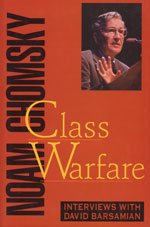 W
WClass Warfare is a book of collected interviews with Noam Chomsky conducted by David Barsamian. It was first published in the United States by Common Courage Press, and in the United Kingdom by Pluto Press, in 1996.
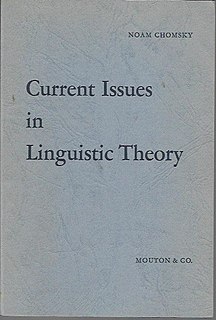 W
WCurrent Issues in Linguistic Theory is a 1964 book by American linguist Noam Chomsky. It is a revised and expanded version of "The Logical Basis of Linguistic Theory", a paper that Chomsky presented in the ninth International Congress of Linguists held in Cambridge, Massachusetts in 1962. It is a short monograph of about a hundred pages, similar to Chomsky's earlier Syntactic Structures (1957). In Aspects of the Theory of Syntax (1965), Chomsky presents many of its ideas in a more elaborate manner.
 W
WDeterring Democracy is a book published in 1991 by Noam Chomsky, which explores the differences between the humanitarian rhetoric and imperialistic reality of United States foreign policy and how it affects various countries around the world.
 W
WFailed States: The Abuse of Power and the Assault on Democracy is a book by Noam Chomsky, first published in 2006, in which Chomsky argues that the United States is becoming a "failed state", and thus a danger to its own people and the world.
 W
WThe Fateful Triangle: The United States, Israel and the Palestinians is a 1983 book by Noam Chomsky about the relationship between the US, Israel and the Palestinians. Chomsky examines the origins of this relationship and its meaningful consequences for the Palestinians and other Arabs. The book mainly concentrates on the 1982 Lebanon War and the "pro-Zionist bias" of most US media and intellectuals, as Chomsky puts it.
 W
WGaza in Crisis: Reflections on Israel's War against the Palestinians is a 2010 collection of interviews and essays from Noam Chomsky and Ilan Pappé that examine Israel's Operation Cast Lead and attempts to place it into the context of Israeli–Palestinian conflict. The book was edited by Frank Barat, who had conducted his first e-mail interview on the subject with Chomsky in 2005, as a result of his joint dialogue with Chomsky and Pappé, previously published as Le Champ du possible, which forms the heart of the work.
 W
WHegemony or Survival: America's Quest for Global Dominance is a study of the American empire written by the American linguist and political activist Noam Chomsky, a professor at the Massachusetts Institute of Technology. It was first published in the United States in November 2003 by Metropolitan Books and then in the United Kingdom by Penguin Books.
 W
WImperial Ambitions: Conversations with Noam Chomsky on the Post-9/11 World is a 2005 Metropolitan Books American Empire Project publication of interviews with American linguist and political activist Noam Chomsky conducted and edited by award-winning journalist David Barsamian of Alternative Radio.
 W
WInterventions is a book by Noam Chomsky, an American academic linguist and political activist. Published in May 2007, Interventions is a collection of 44 op-ed articles, post-9/11, from September 2002, through March 2007. The book's subjects span from 9/11 and the Iraq War to social security and intelligent design, South America and Asia, the Israeli occupation of Palestine and the election of Hamas, Hurricane Katrina, and the US concept of "just war". The Pentagon banned the book from its Guantanamo Bay prison because it might negatively "impact... good order and discipline." Chomsky replied that, "This happens sometimes in totalitarian regimes."
 W
WKnowledge of Language: Its Nature, Origin, and Use is a book by American linguist Noam Chomsky, first published in 1986. In this book, Chomsky deals with topics in the philosophy of language and the philosophy of mind. He argues that the study of linguistic structures provides insight into the workings of human mind.
 W
WLanguage and Mind is a 1968 book of three essays on linguistics by Noam Chomsky. An expanded edition in 1972 added three essays and a new preface.
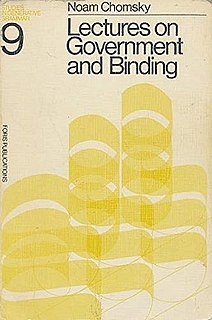 W
WLectures on Government and Binding: The Pisa Lectures (LGB) is a book by American linguist Noam Chomsky, published in 1981. It is based on the lectures Chomsky gave at the GLOW conference and workshop held at the Scuola Normale Superiore in Pisa, Italy in 1979. In this book, Chomsky presented his government and binding theory of syntax. It had great influence on the syntactic research in early 1980s, especially among the linguists working within the transformational grammar framework.
 W
WLetters from Lexington: Reflections on Propaganda, first published in 1993, contains Noam Chomsky's criticism of the American media. The articles are available in parts on the Noam Chomsky Archive.
 W
WThe Logical Structure of Linguistic Theory or LSLT is a major work in linguistics by American linguist Noam Chomsky. It was written in 1955 and published in 1975. In 1955, Chomsky submitted a part of this book as his PhD thesis titled Transformational Analysis, setting out his ideas on transformational grammar; he was awarded a Ph.D. for it, and it was privately distributed among specialists on microfilm. Chomsky offered the manuscript of LSLT for publication, but MIT's Technology Press refused to publish it.
 W
WMaking the Future: Occupations, Interventions, Empire and Resistance is a 2012 collection of political op-ed columns written by Noam Chomsky and edited by John Stickney for monthly publication by the New York Times Syndicate between April 2, 2007 and October 31, 2011. The columns, according to Stickney, “present a narrative of the events that have made the future since 2007,” including War in Afghanistan and Iraq, the 2008 U.S. presidential race; the Chinese Century, the pink tide, nuclear proliferation, the Gaza War, Israeli settlement, climate change, the global financial crisis, the Arab Spring, the death of Osama bin Laden and the Occupy movement.
 W
WManufacturing Consent: The Political Economy of the Mass Media is a 1988 book by Edward S. Herman and Noam Chomsky arguing that the mass communication media of the U.S. "are effective and powerful ideological institutions that carry out a system-supportive propaganda function, by reliance on market forces, internalized assumptions, and self-censorship, and without overt coercion", by means of the propaganda model of communication. The title refers to consent of the governed, and derives from the phrase "the manufacture of consent" used by Walter Lippmann in Public Opinion (1922). The book was honored with the Orwell Award.
 W
WNecessary Illusions: Thought Control in Democratic Societies is a 1989 book by United States academic Noam Chomsky concerning political power using propaganda to distort and distract from major issues to maintain confusion and complicity, preventing real democracy from becoming effective. The title of this book borrows a phrase from the writings of Reinhold Niebuhr.
 W
WOccupy is a short study of the Occupy movement written by the American academic and political activist Noam Chomsky. Initially published in the United States by the Zuccotti Park Press as the first title in their Occupied Media Pamphlet Series in 2012, it was subsequently republished in the United Kingdom by Penguin Books later that year.
 W
WThe Political Economy of Human Rights is a 1979 two-volume work by Noam Chomsky and Edward S. Herman. The authors offer a critique of United States foreign policy, particularly in Indochina.
 W
WProfit Over People: Neoliberalism and Global Order is a 1999 book by Noam Chomsky, published by Seven Stories Press. It contains his critique of neoliberalism.
 W
WThe Prosperous Few and the Restless Many is a short book compiling three revised interviews of the United States academic Noam Chomsky by David Barsamian, originally conducted on December 16, 1992, January 14 and 21, 1993.
 W
WReflections on Language is a 1975 book in which the linguist Noam Chomsky argues for a rationalist approach to human nature in which human capability is seen as innate rather than a blank slate upon which psychological and social forces act (empiricism). The New York Times selected the book as among the year's best.
 W
WRequiem for the American Dream: The 10 Principles of Concentration of Wealth & Power is a book by political activist and linguist Noam Chomsky. It was created and edited by Peter Hutchinson, Kelly Nyks, and Jared P. Scott. It lays out Chomsky's analysis of neoliberalism. It focuses on the concentration of wealth and power in United States over the past forty years, analyzing the phenomenon known as income inequality. The book was published by Seven Stories Press in 2017.
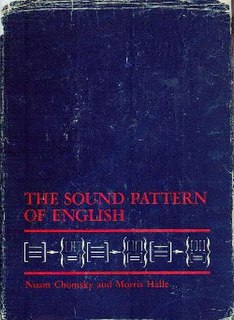 W
WThe Sound Pattern of English is a 1968 work on phonology by Noam Chomsky and Morris Halle. It presents a view of the phonology of English, and has been very influential in both the field of phonology and in the analysis of the English language. Chomsky and Halle present a view of phonology as a linguistic subsystem, separate from other components of the grammar, that transforms an underlying phonemic sequence according to rules and produces as its output the phonetic form that is uttered by a speaker. The theory fits with the rest of Chomsky's early theories of language in the sense that it is transformational; as such it serves as a landmark in Chomsky's theories by adding a clearly articulated theory of phonology to his previous work which focused on syntax.
 W
WSyntactic Structures is an influential work in linguistics by American linguist Noam Chomsky, originally published in 1957. It is an elaboration of his teacher's, Zellig Harris's, model of transformational generative grammar. A short monograph of about a hundred pages, Chomsky's presentation is recognized as one of the most significant studies of the 20th century, and in 2011 was selected by Time magazine as one of the 100 most important nonfiction books ever written. It contains the now-famous sentence "Colorless green ideas sleep furiously", which Chomsky offered as an example of a grammatically correct sentence that has no discernible meaning. Thus, Chomsky argued for the independence of syntax from semantics.
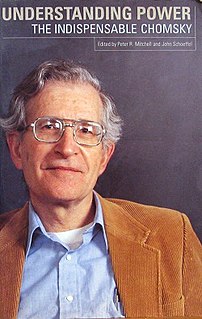 W
WUnderstanding Power: The Indispensable Chomsky is a book which came out in 2002. It is a collection of previously unpublished transcripts of seminars, talks, and question-and-answer sessions conducted by Noam Chomsky from 1989 to 1999.
 W
WWorld Orders Old and New is a book by Noam Chomsky, first published in 1994 and updated in 1996 by Columbia University Press. In the book, Chomsky writes about the international scene since 1945, devoting particular attention to events following the collapse of the Soviet Union. He critiques Western government, from imperialist foreign policies to the Clinton administration's promises to the poor. His judgment of the "new world order" foresees a growing abyss between the rich and poor, in the United States and internationally.